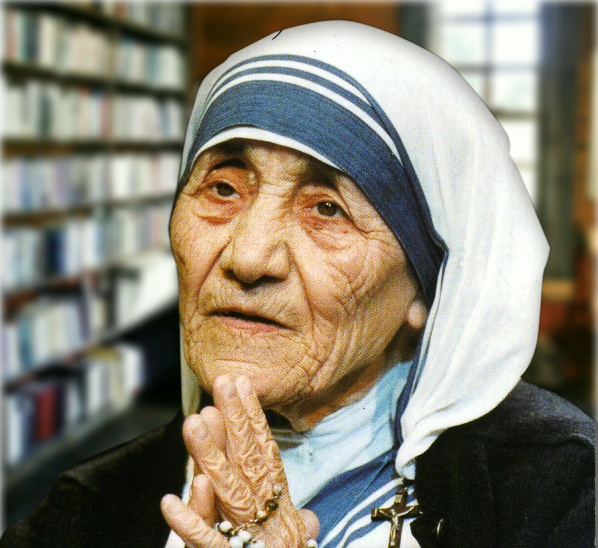GONXHA AGNES BOJAXHIU, born in Yugoslavia of Albanian parents, became SISTER TERESA when at the age of 18 she took her vows in the Institute of the Virgin Mary in Ireland. The following year, in 1929, she was sent to the Loreto Community in Calcutta where for 20 years she fulfilled her obligations as a teacher.
Called by the misery of bruising poverty in the surrounding slums, her petition to help in a more direct way was granted in 1948. With the permission of Pope Pius XII, she founded a new Indian congregation, the Missionaries of Charity, devoted entirely to the poor. Assuming Indian citizenship, she chose for the fledgling community a habit suited to its mission and locale — a simple, white cotton sari edged with blue.
MOTHER TERESA and the small group of Indian nuns she had trained started their work with clinics and feeding centers. Soon police and others began to bring to her doorstep children and adults left to die in the streets. Determined that these unwanted must have a place to spend their last days in peace, she founded, in 1952, in an ancient, teeming quarter of Calcutta, the Nirmal Hriday, or Pure Heart — a unique hospital for dying destitutes.
For abandoned lame, blind and tubercular children, the Missionaries of Charity run a second home, Sishu Bhavan. Six dispensaries are now operated with the assistance of volunteer doctors and at 52 relief centers, food, milk and clothing collected by the Missionaries are given to the needy. In the poorest districts of the city, under trees or a matting roof, the Missionaries conduct regular day schools, teaching children to read and write in Hindi and do simple sums.
Leprosy being prevalent and facilities for treatment overburdened, a mobile clinic manned by nuns trained in the Leprosy Department of the Hospital for Tropical Diseases administers especially to lepers. On a more modest scale this work is repeated in Delhi and six other cities. The Missionaries also maintain a home in Delhi for orphans and retarded children.
MOTHER TERESA’s community now numbers 169. Most are Indians, excepting 10 from Pakistan, Nepal, Malta, Albania, Yugoslavia, Germany, England and the United States. Living as austerely as their slum neighbors, the Missionaries of Charity depend upon donations and on a special Flag Day the public is invited to assist the work among the lepers. Moving chiefly among Hindus and Moslems, they make no attempts at conversion, but treat alike men of all castes, creeds and colors, concerned solely with injecting dignity into the lives of the unfortunate.
In electing MOTHER TERESA to receive the 1962 Ramon Magsaysay Award for Peace and International Understanding, the Board of Trustees recognizes her merciful cognizance of the abject poor of a foreign land, in whose service she has led a new congregation.
I am very happy to be here today, to join with you in thanking God to have given to the world, torn with suffering, a man like Ramon Magsaysay, who loved and served his people so well. This award which is given to me and through me to the young Congregation, to the countless benefactors and to our poor in India, will be a new source of encouragement for us to love and serve the poor as Ramon Magsaysay did with our whole heart and soul.
Our Congregation is totally dedicated to the Service of the Poor, to serve Christ in His distressing disguise. Therefore our home for the dying, the home for the crippled and unwanted children, our care of lepers, our slum schools, our clinics, all come from that Source and aim at the same idea, to give wholehearted free Service to the Poor for the Love of God.

